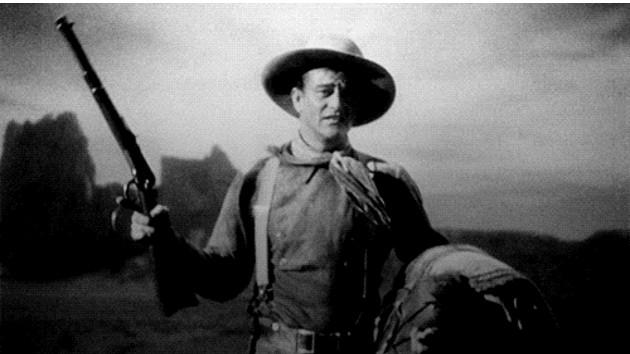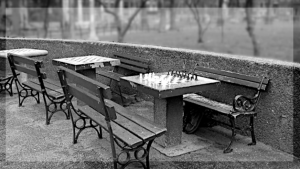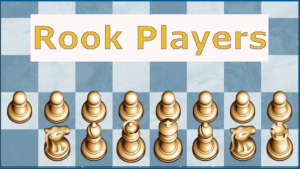
The Duke
Many people who have no knowledge of or even interest in Chess know the name Bobby Fischer because he is so iconic. There are such icons in all endeavors - those who transcend their fields and become public figures, such as Einstein, Elvis, Babe Ruth, Mozart, etc.
I know little or nothing about the video-media. I don't watch TV nor do I attend the cinema. Still, there are certain persons who work, or have worked, in the film and TV industries whose names I'm very familiar with.
One of these persons is John Wayne.
My perception of John Wayne has always been that of an anti-intellectual, brutish sort of man who theatrically and single-handedly rid the world of evil Germans, Japanese and Native Americans, for which he had been placed upon the pedestal of the American Male Ideal.
Of course, I knew that John Wayne had been a chess player and years ago had even incorporated images of him playing chess in a photomontage I had created about chess and famous personalities.
Some time ago, Bill Wall posted a photo of Wayne playing chess in a chess.com thread called "Greatest Chess Photos." NM Rex Blalock (Reb) replied that he was surprised to learn that John Wayne had been a chess player. So, Reb knew about John Wayne but didn't know he was a chess player, while I knew he was a chess player but really knew next to nothing about John Wayne the man. This gave me the incentive to learn something concrete about the man whom I only knew from impressions and see what I could find out about his chess-playing.
Here goes . . .

John Wayne was a more complex man than appears on the surface.
"Park Turril, who taught chemistry at Glendale, said Duke was a 'fine student. He did fine work, understood write-ups and never complained. He got A's all the way through.' He headed the school's debate team, won honor pins several years in a row, played an aggressive game of chess. was all but unbeatable at bridge and hearts because of an uncanny ability to count cards, and graduated with a four-year average of ninety-four, the salutorian in a class of two hundred students."
—from "John Wayne," by Randy Roberts and James Stuart Olson
[the revelation that Rock Hudson was gay became public knowledge in 1985 when he was dying from AIDS. Before then...] "...it wasn't news to most in the business. Wayne obviously felt a need, in 1974, to quickly establish how much I knew before he spoke out of turn, asking me, 'You know about Rock?'
I replied, 'He's a homosexual? Yes. I know!'
That opened a whole side of Wayne I would have never expected to see. 'Who the hell cares if he's a queer? The man plays great chess. We had many a game up there in Durango. And what a good-looing man. I admit, I couldn't understand how a guy with those looks and that build and the . . .manly way he had about him could have been a homosexual, but it never bothered me. Life's too short. It wasn't like some of his type who go around saying, 'Poor me, I'm discriminated against.' He just got on with his life in private, and I never cared to know about it. All I cared about was that he was on the set on time every day, and at the end of the day he'd say, 'Care for a little chess, Duke?' and I'd say, 'You wanna get beat again?''"
—from "John Wayne," by Michael Munn

—John Wayne on the set of "Hondo," 1953
"Wayne soon became convinced that nobody could write dialogue for him as suitably as Jimmy Grant. The two became close friends and collaborators on projects until Grant's death in 1966. The writed kowtowed to Duke and tended to tell the star what he wanted to hear. One longtime observer maintained that Grant played chess with Wayne for over twenty years and managed never to win a game."
—from "Duke," by Ronald L. Davis

John Wayne on the set of "Chishum"
"A journalist who visited the set of The Fighting Kentuckian wrote that the assemblage gathered there looked like an overgrown Western family: 'In one corner, the Duke in coonskin cap, suede jacket, and dirty horsehide pants was playing chess with his stand-in. Grant Withers, Paul Fix, Bob Morrison - the Duke's brother, who is assistant director - and other compadres straddled around shootong the breeze.'"
—from "Duke," by Ronald L. Davis

Image courtesy of Bettmann/CORBIS
March 16, 1947 Hollywood
Original caption:
3/6/1947-Hollywood, CA-: A minature chess board helps John Wayne while away moments between scenes of a new motion picture, "Tycoon." The interested spectator over his left shoulder is Laraine Day, his leading lady in the action film. For her role in the picture, her hair was darkened from blonde. For both of these stars this film is the most dangerous one in which they have yet worked. Explosions for building a railway make many of the scenes an insurance headache.
"He was a very emotional guy, too. A lot of people might not think so, but he was. He loved to play bridge and he loved chess. In the pictures I did with him, he's always be playing chess over inthe corner. Ed Faulkner was Duke's chess partner. Ed was a good actor and a good chess player, but I don't think he ever did beat Duke." [Andrew V. McLaglen]
—from "Duke, We're Glad We Knew You," by Herb Fagen
"I was a darn good chess player, too, and [I] had lots of matches with Duke during th filming [of Red River]. I never won once." [Pierce Lyden]
—from "Duke, We're Glad We Knew You," by Herb Fagen
"He was a very good chess player. On one occassion I was watching. I don't know who he was playing, but he was chewing tobacco at the time. So he had this cup that you spit the chew into. He was so involved in the game and he turns to the side, keeps his eyes on the board, and spits. I said, 'Oh shit, Duke!' Now I have broken his concentration. He say, 'What the hell's your problem, mister?' I said, Goddammit, you spit on my boot, Duke!"' Well he thought that was the funniest thing that ever happened. And he laughed and laughed. I don't know what he found so humorous, but he just cracked up." [Robert Mitchum]
—from "Duke, We're Glad We Knew You," by Herb Fagen

"McLintock!": Maureen O'Hara, John Wayne 1995
Description: Instead of discussing their daughter's future with his wife, McLintock departs to Birnbaum's store for a chess play - which gets disturbed by an outraged Katherine late at night.
"His closest friend in Newport Beach was Porsche dealer Chick Iverson, but he also saw a great deal of Claire Trevor Bren and her husband. Duke and Milton Bren, a small, caustic yachtsman who took pleasure in poking fun at Waybe, shared many interests, and Wayne enjoyed the teasing. The Brens lived only three minutes away from Bayshore, and Duke frequently played chess with their younger son. When the boy was killed, Wayne wrote Claire Trevor a letter that she treasured. 'He was a man of deep feelings," and actress said, "much deeper than one would expect of John Wayne'.
Duke also liked to visit Maureen O'Hara and her husband Charles Blair, at their home in the Virgin Islands. Waybe and Blair spent hours playing chess and flying in a private plane to surrounding islands."
—from "Duke" By Ronald L. Davis
"Duke and Charlie [Charles F. Blair, her last husband] loved spending time together playing chess and I rarely saw them the whole time the Duke was visiting. They went fishing and flying in this big seaplane almost every day."
—from "'Tis Herself," by Maureen O'Hara and John Nicoletti

Playing chess with Marlene Dietrich between takes
on Ray Enright's PITTSBURGH (1942)

Marlene Dietrich at the Pan-Am Games in Hollywood 1945
[While starring together in the film "Seven Sinners"] "...for a time Dietrich and Wayne were intimate and appeared together at Moambo, the Trocadero, and other Hollywood night spots, all of which was good publicity for Duke. Dietrich attended football games and orizefights with him and they spent weekends together hunting and fishing. She brought him home-cooked meals on the set and they played chess while the crew prepared the next scene."
—from "Duke," by Ronald L. Davis

John Wayne playing chess with David Sutton 1969
(supposedly Wayne and photo-journalist Sutton played over 5,000 games together)
"Wayne oozed charisma aboard the Wild Goose [a 136' former naval vessel, bought for $110,000 in 1962, remodeled into a luxury boat requiring a crew of eight], and he played cards or chess for hours on its sixty-foot afterdeck."
—from "Duke" by Ronald L. Davis
 on the set of "Commancheros" -
on the set of "Commancheros" -

John Wayne with William Windom

Wayne with his son Ethan

Wayne with his son Patrick



